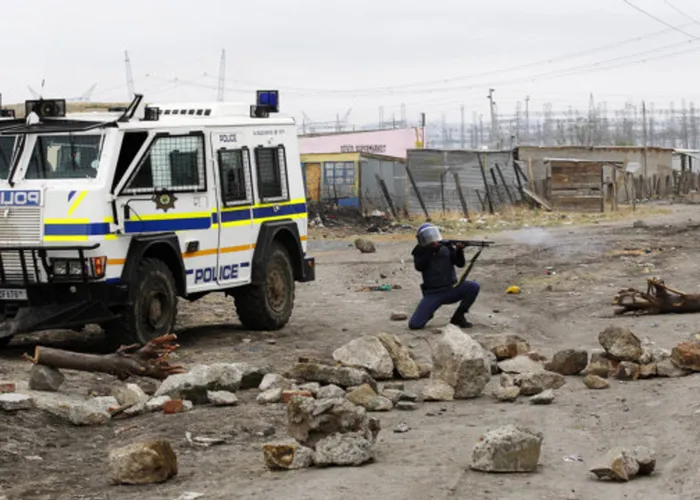Cops’ Marikana decision taken before Aug 16

A police officer fires shots to disperse miners at Lonmin's Marikana operation. File photo: Reuters A police officer fires shots to disperse miners at Lonmin's Marikana operation. File photo: Reuters
Rustenburg -
A police decision to end a gathering of striking Lonmin miners at Marikana was taken before the fatal shooting on August 16, the Farlam Commission heard on Monday.
Evidence leader Geoff Budlender said this emerged in a Joint Operations Centre (JOC) briefing held at 1.30pm on August 16.
Provincial police commissioner Lt-Gen Nosaziso Mbombo had taken the decision and communicated it to her deputy the night before.
Maj-Gen Charl Annandale, who led the police's special tactical operations team, said on Monday he could not comment on the discussion between Mbombo and her deputy Maj-Gen William Mpembe.
The commission is holding public hearings at the Rustenburg civic centre into the events at Marikana on August 16.
On that day, 34 striking miners were shot dead and 78 wounded when police opened fire on them while trying to disperse a group which had gathered on a hill near the mine.
In the preceding week, 10 people, including two police officers and two security guards, were killed in strike-related violence near the mine.
Budlender referred to a video clip and press cuttings about the situation at Marikana before the 1.30pm meeting.
The video showed Mbombo talking at a press briefing in the morning, saying that police would ask protesters to disperse, and saying: “Today we are ending this matter”.
In the press clippings, police spokesman Captain Dennis Adriao is quoted as saying: “Today, unfortunately, is D-Day”.
Police had expected the miners to disarm on August 16, after Association of Mineworkers and Construction Union president Joseph Mthunjwa urged them to do so. In the event, the protesters did not heed Mthunjwa's advice.
Budlender said in other evidence before the commission there were indications police only intended to move in on protesters, referred to as “stage three” of the plan, if the risk of violence escalated.
“In the event, a decision had already been taken to implement stage three, even though no escalation had taken place... that was a deviation from the original plan.”
Annandale said crime intelligence reports, although vague, implied the situation had escalated.
He said the JOC meeting concurred with the decision to implement stage three.
“This was her advice. I want to say (if Mbombo) says you are going to do it this-and-this-and-this way, we would not have done it if we were not in agreement.”
Budlender said it was unclear whether the trigger for stage three was the protesters' failure to disarm, or an escalation of violence. - Sapa